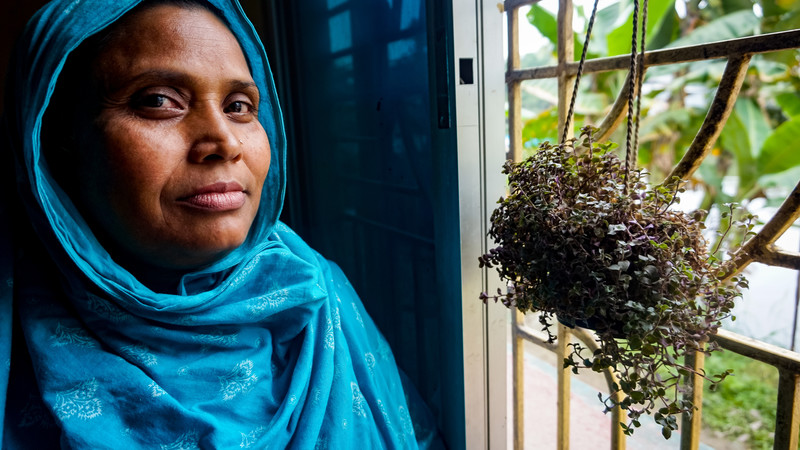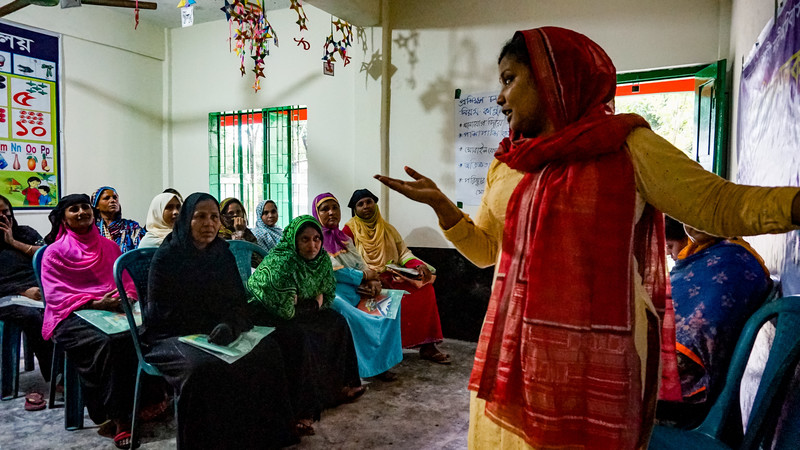Access to justice for Bangladeshi migrant workers

A new report produced with funding from CAFOD puts forward recommendations on how to make migration safer for Bangladeshi migrant workers. Chloe Sideserf, our regional support officer for Asia, heard the story of one woman who went overseas to seek employment.
’I was no use to them anymore,’ Ralia, a female returnee migrant, tells me. ‘They left me with no food or water and on my last day in captivity, I nearly died.’
I met Ralia in Bangladesh six weeks ago. She told me about the torture, abuse and psychological trauma she experienced at the hands of her employers in Saudi Arabia.
Ralia is one of more than 700,000 migrants from Bangladesh who travelled overseas for work in 2018 and is part of the growing number of women who are seeking a better life for themselves and their families back home.
In spite of the many challenges she faced, Ralia has managed to return home to Bangladesh, but ‘the trauma is still there’ she says.
Many other women and underage girls migrating for work overseas face the same fate as Ralia. Thousands of migrants returning empty handed, haunted by their experiences and unable to seek the justice they deserve.
Why do people living in Bangladesh migrate?
With nearly one quarter (24.61%) of its workforce unemployed or underemployed, and the growing pressure of new entrants (around 1.5 million) into the labour market each year, Bangladesh has become one of the top 10 countries of origin for labour migrants. These migrant workers are vital contributors to the Bangladesh economy, contributing approximately US$15 billion in remittances in 2018 alone, making up almost 10% of Bangladesh’s GDP.
To ensure the protection and welfare of Bangladeshi migrants, as well as regulate the migration system, the government of Bangladesh has put some commendable policies, laws and regulations in place. However, the government is still unable to ensure a transparent and accountable recruitment system that protects the rights of migrant workers, especially those of women and underage girls who are subject to trafficking, exploitation and rights violations.
What is CAFOD doing to help?
In response to this situation, CAFOD – together with Ovibashi Karmi Unnayan Program (OKUP), a grassroots migrant organisation in Bangladesh – is undertaking a three-year project entitled “Empowerment of Women and Girl Migrant Workers, Communities and Key Institutions to Protect and Promote Migrant Workers’ Rights and Access to Justice”.
The CAFOD and EU-funded project hopes to ensure that women and girl migrant workers and their communities are more resilient to, and united against unsafe migration, trafficking and exploitation, and their rights are better protected through improved institutional justice mechanisms.

As part of this project and based on the extensive experience of OKUP working with women and girl migrants, our partner has produced a research paper highlighting the challenges and barriers to justice faced by women and girl migrants.
Through the lived experience of 110 cases of women and girl migrants who survived abuse and exploitation, the report highlights the gaps in the current justice system and puts forward recommendations for its improvement.
What do we hope the report will achieve?
When the Access to Justice report was first launched, CAFOD and OKUP held an event that was attended by a Bangladeshi MP and a number of government officials, journalists and civil society organisations. The event gained wide news coverage across Bangladesh and was picked up by the news outlet Al Jazeera.
With the publication of the Access to Justice report and the ongoing work of the project, we hope we can raise awareness amongst policy makers and key stakeholders for the necessary improvements in justice mechanisms to enable Bangladeshi migrant workers, especially women and girls, to get proper redress and compensation for the abuse, exploitation and rights violations they encounter.
Through our partner’s project, we can help women like Ralia find the justice they deserve and promote migrant workers’ rights.